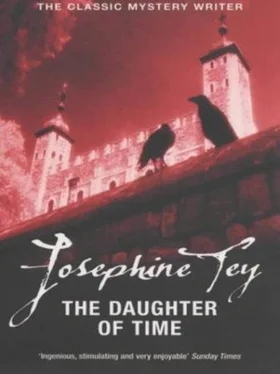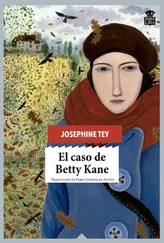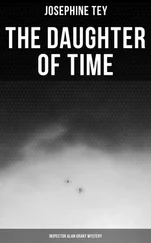Josephine Tey - The Daughter of Time
Здесь есть возможность читать онлайн «Josephine Tey - The Daughter of Time» весь текст электронной книги совершенно бесплатно (целиком полную версию без сокращений). В некоторых случаях можно слушать аудио, скачать через торрент в формате fb2 и присутствует краткое содержание. Год выпуска: 2010, Жанр: Классический детектив, на английском языке. Описание произведения, (предисловие) а так же отзывы посетителей доступны на портале библиотеки ЛибКат.
- Название:The Daughter of Time
- Автор:
- Жанр:
- Год:2010
- ISBN:нет данных
- Рейтинг книги:5 / 5. Голосов: 1
-
Избранное:Добавить в избранное
- Отзывы:
-
Ваша оценка:
- 100
- 1
- 2
- 3
- 4
- 5
The Daughter of Time: краткое содержание, описание и аннотация
Предлагаем к чтению аннотацию, описание, краткое содержание или предисловие (зависит от того, что написал сам автор книги «The Daughter of Time»). Если вы не нашли необходимую информацию о книге — напишите в комментариях, мы постараемся отыскать её.
The Daughter of Time — читать онлайн бесплатно полную книгу (весь текст) целиком
Ниже представлен текст книги, разбитый по страницам. Система сохранения места последней прочитанной страницы, позволяет с удобством читать онлайн бесплатно книгу «The Daughter of Time», без необходимости каждый раз заново искать на чём Вы остановились. Поставьте закладку, и сможете в любой момент перейти на страницу, на которой закончили чтение.
Интервал:
Закладка:
The King of France will allow no one to use salt, but what is bought of himself at his own arbitrary price. The troops pay for nothing, and treat the people barbarously if they are not satisfied. All growers of vines must give a fourth to the King. All the towns must pay the King great yearly sums for his men-at-arms. The peasants live in great hardship and misery. They wear no woollen. Their clothing consists of little short jerkins of sackcloth, no trowse but from the knees up, and legs exposed and naked. The women all go barefoot. The people eat no meat, except the fat of bacon in their soup. Nor are the gentry much better off. If an accusation is brought against them they are examined in private, and perhaps never more heard of.
In England it is very different. No one can abide in another man’s house without his leave. The King cannot put on taxes, nor alter the laws, nor make new ones. The English never drink water except for penance. They eat all sorts of flesh and fish. They are clothed throughout in good woollens, and are provided with all sorts of household goods. An Englishman cannot be sued except before the ordinary judge.
And it seemed to Grant that if you were very hard up and wanted to go to see what your Lizzie’s first-born looked like it must have been reassuring to know that there was shelter and a hand-out at every religious house, instead of wondering how you were going to raise the train fare. That green England he had fallen asleep with last night had a lot to be said for it.
He thumbed through the pages on the fifteenth century, looking for personal items; for individual reports that might, in their single vividness, illumine the scene for him as a ‘spot’ lights the desired part of a stage. But the story was distressingly devoted to the general. According to Mr Tanner, Richard III’s only Parliament was the most liberal and progressive within record; and he regretted, did the worthy Mr Tanner, that his private crimes should have militated against his patent desire for the common weal. And that seemed to be all that Mr Tanner had to say about Richard III. Except for the Pastons, chatting indestructibly through the centuries, there was a dearth of human beings in this record of humanity.
He let the book slide off his chest, and searched with his hand until he found The Rose of Raby.
5
The Rose of Raby proved to be fiction; but it was at least easier to hold than Tanner’s Constitutional History of England. It was, moreover, the almost-respectable form of historical fiction which is merely history-with-conversation, so to speak. An imaginative biography rather than an imagined story. Evelyn Payne-Ellis, whoever she might be, had provided portraits and a family tree, and had made no attempt, it seemed, to what he and his cousin Laura used to call in their childhood ‘write forsoothly’. There was no ‘by our Ladys’, no ‘nathelesses’ or ‘varlets’. It was an honest affair according to its lights.
And its lights were more illuminating than Mr Tanner.
Much more illuminating.
It was Grant’s belief that if you could not find out about a man, the next best way to arrive at an estimate of him was to find out about his mother.
So until Marta could provide him with the sainted and infallible Thomas More’s personal account of Richard, he would make do very happily with Cecily Nevill, Duchess of York.
He glanced at the family tree, and thought that if the two York brothers, Edward and Richard, were, as kings, unique in their experience of ordinary life they were no less unique in their Englishness. He looked at their breeding and marvelled. Nevill, Fitzalan, Percy, Holland, Mortimer, Clifford and Audley, as well as Plantagenet. Queen Elizabeth (who made it her boast) was all English; if one counted the Welsh streak as English. But among all the half-bred monarchs who had graced the throne between the Conquest and Farmer George – half-French, half-Spanish, half-Danish, half-Dutch, half-Portuguese – Richard IV and Richard III were remarkable in their home-bred quality.
They were also, he noted, as royally bred on their mother’s side as on their father’s. Cecily Nevill’s grandfather was John of Gaunt, the first of the Lancasters; third son of Richard III. Her husband’s two grandfathers were two other sons of Richard III. So three of Edwards III’s five sons had contributed to the making of the two York brothers.
‘To be a Nevill,’ said Miss Payne-Ellis ‘was to be of some importance since they were great landowners. To be a Nevill was almost certainly to be handsome, since they were a good-looking family. To be a Nevill was to have personality, since they excelled in displays of both character and temperament. To unite all three Nevill gifts, in their finest quality, in one person was the good fortune of Cicely Nevill, who was the sole Rose of the north long before that north was forced to choose between White Roses and Red.’
It was Miss Payne-Ellis’s contention that the marriage with Richard Plantagenet, Duke of York, was a love match. Grant received this theory with a scepticism bordering on scorn until he noticed the results of that marriage. To have a yearly addition to the family was not, in the fifteenth century, evidence of anything but fertility. And the long family produced by Cicely Nevill to her charming husband augured nothing nearer love than cohabitation. But in a time when the wife’s rôle was to stay meekly at home and see to her still-room, Cecily Nevill’s constant travellings about in her husband’s company were surely remarkable enough to suggest an abnormal pleasure in that company. The extent and constancy of that travel was witnessed to by the birthplaces of her children. Anne, her first, was born at Fotheringhay, the family home in Northamptonshire. Henry, who died as a baby, at Hatfield. Edward at Rouen, where the Duke was on active service. Edmund and Elizabeth also at Rouen. Margaret at Fotheringhay. John, who died young, at Neath in Wales. George in Dublin (and could it be, wondered Grant, that that accounted for the almost Irish perverseness of the ineffable George?). Richard at Fotheringhay.
Cecily Nevill had not sat at home in Northamptonshire waiting for her lord and master to visit her when it seemed good to him. She had accompanied him about the world of their inhabiting. There was strong presumption in favour of Miss Payne-Ellis’s theory. At the very canniest reckoning it was patently a very successful marriage.
Which perhaps accounted for the family devotion of those daily visits of Edward to his small brothers in the Pastons’ lodgings. The York family, even before its tribulations, was a united one.
This was borne out unexpectedly when, spurting the pages from under his thumb, he came on a letter. It was a letter from the two elder boys, Edward and Edmund, to their father. The boys were at Ludlow Castle, undergoing their education, and on a Saturday in Easter week, taking advantage of a courier who was going back, they burst out in loud complaint of their tutor and his ‘odiousness’ and begged their father to listen to the tale of the courier, William Smyth, who was fully charged with the details of their oppression. This S.O.S. was introduced and ended in respectful padding, the formality of which was a little marred by their pointing out that it was nice of him to send the clothes but that he had forgotten their breviary.
The conscientious Miss Payne-Ellis had given the reference for this letter (one of the Cotton manuscripts, it appeared) and he thumbed more slowly, in search of more. Factual evidence was a policeman’s meat.
He could not find any, but he came on a family tableau which held him for a moment.
The Duchess moved out into the thin sharp sunlight of a London December morning, and stood on the steps to watch them go: her husband, her brother, and her son. Dirk and his nephews brought the horses into the courtyard, scattering the pigeons and the fussing sparrows from the cobbles. She watched her husband mount, equable and deliberate as always, and thought that for all the emotion he showed he might be riding down to Fotheringhay to look at some new rams instead of setting out on a campaign. Salisbury, her brother, was being Nevill and temperamental; a little conscious of the occasion and living up to it. She looked at them both and smiled in her mind at them. But it was Edmund who caught at her heart. Edmund at seventeen, very slender, very untried, very vulnerable. Flushed with pride and excitement at this setting-out to his first campaigning. She wanted to say to her husband: ‘Take care of Edmund,’ but she could not do that. Her husband would not understand; and Edmund, if he were to suspect, would be furious. If Edward, only a year older, was commanding an army of his own on the borders of Wales at this very minute, then he, Edmund, was more than old enough to see war at first-hand.
Читать дальшеИнтервал:
Закладка:
Похожие книги на «The Daughter of Time»
Представляем Вашему вниманию похожие книги на «The Daughter of Time» списком для выбора. Мы отобрали схожую по названию и смыслу литературу в надежде предоставить читателям больше вариантов отыскать новые, интересные, ещё непрочитанные произведения.
Обсуждение, отзывы о книге «The Daughter of Time» и просто собственные мнения читателей. Оставьте ваши комментарии, напишите, что Вы думаете о произведении, его смысле или главных героях. Укажите что конкретно понравилось, а что нет, и почему Вы так считаете.












